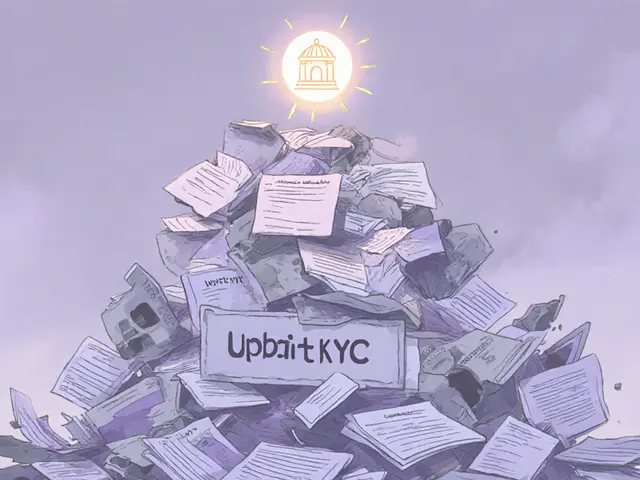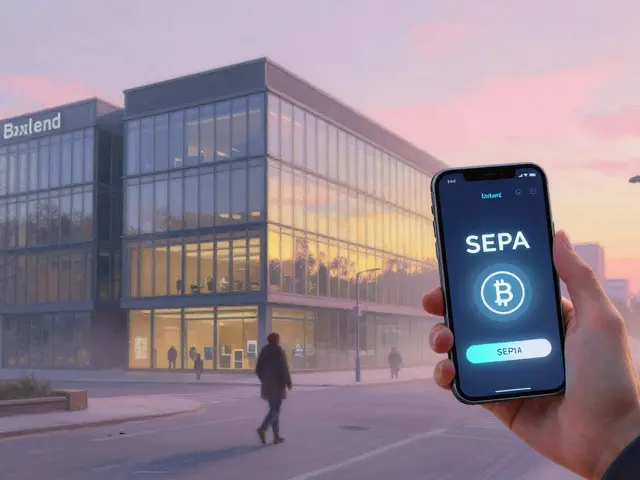OFAC Cryptocurrency Sanctions and Compliance: What Crypto Businesses Must Do in 2025

OFAC Crypto Address Compliance Checker
Check if a cryptocurrency wallet address is on the OFAC Specially Designated Nationals (SDN) list. As of October 2025, OFAC has added over 1,200 crypto addresses to their sanctions list. This tool simulates the screening process your business should implement.
Note: This is a simulation tool for educational purposes only. Real compliance requires integration with OFAC's official lists and blockchain analytics tools.
OFAC Cryptocurrency Sanctions and Compliance: What Crypto Businesses Must Do in 2025
If you run a crypto exchange, wallet service, or even a DeFi platform, and you serve users in the U.S. or handle U.S. dollars, OFAC cryptocurrency sanctions aren’t something you can ignore. They’re not optional. They’re not a suggestion. They’re a legal requirement with real penalties - and enforcement is getting tighter every month.
In 2025, OFAC (the Office of Foreign Assets Control) has moved from warning to action. Companies are being fined millions. Executives are being held personally accountable. And blockchain addresses are now listed alongside names on the Specially Designated Nationals (SDN) list. You can’t claim you didn’t know. The rules are clear. The tools exist. The question isn’t whether you need to comply - it’s whether your system can actually do it.
What OFAC Actually Controls - And Who It Targets
OFAC is part of the U.S. Treasury. It’s been around since 1950, but its power over crypto only became official in 2018, when it first blocked a Bitcoin address linked to a sanctioned entity. Since then, it’s added over 1,200 crypto addresses to its SDN list as of October 2025. These aren’t random. They’re tied to terrorists, drug cartels, Russian oligarchs, Iranian cyber units, and North Korean hacking groups.
OFAC doesn’t just go after big exchanges. It targets anyone who touches crypto and has a connection to the U.S. - that includes:
- Companies incorporated in the U.S.
- Employees or contractors located in the U.S.
- Anyone using U.S. financial systems (even if you’re based in Australia or Singapore)
- Platforms that process transactions involving U.S. dollars or U.S.-based banks
It doesn’t matter if you’re a small DeFi protocol or a startup in Perth. If your users are in Iran, Cuba, Syria, or Russia - and you didn’t block them - you’re at risk.
How OFAC Enforces Crypto Sanctions - And Why It’s Different
OFAC operates under strict liability. That means you can be punished even if you didn’t mean to break the rules. No intent. No knowledge. Just a transaction that went through a blocked wallet.
The ShapeShift case in September 2025 is a textbook example. The exchange processed over $12.5 million in crypto from users in sanctioned countries. They didn’t have geolocation checks. They didn’t screen wallet addresses. They claimed they didn’t know where users were coming from. OFAC didn’t care. They fined ShapeShift $750,000.
Compare that to the UK’s OFSI, which has only issued three crypto-related penalties since 2018. Or Singapore, which has handed out five. OFAC has issued 17 since 2018 - and over $48 million in total penalties. They’re not bluffing.
And it’s not just about blocking users. OFAC now goes after entire networks. In August 2025, they sanctioned Garantex Europe OU - and then went after its successor, Grinex, plus six other linked companies across Russia and Kyrgyzstan. This is the new normal: network-wide sanctions.
The Four Technical Requirements for Compliance
You can’t rely on manual checks. You need automation. Here’s what your system must do:
- Screen every wallet address - Before any deposit or withdrawal, your system must check the sender and receiver against the OFAC SDN list. That includes not just the address, but any linked addresses identified through blockchain analysis.
- Block blocked assets - If a transaction hits a sanctioned address, you must freeze the funds. OFAC doesn’t require you to convert them to fiat. You can keep them in a locked wallet labeled “Blocked SDN Digital Currency.” But you can’t move them. Not even a little.
- Use blockchain analytics tools - You need software like Chainalysis, Elliptic, or TRM Labs. These tools map transaction flows, detect mixing services, and flag high-risk wallets. Crystal Intelligence’s 2025 report says 98% of large exchanges use these tools - and 73% of smaller ones don’t. Guess who gets fined?
- Monitor for privacy coins - Monero, Zcash, and other privacy-focused coins are a major blind spot. OFAC’s October 2025 update to FAQ 646 says you must take “reasonable measures” to prevent transactions involving blocked persons - even if the counterparty is anonymous. That means you might need to block entire privacy coin pools if they’re frequently used by sanctioned actors.
One Coinbase compliance officer told Reddit that OFAC added 37 new crypto addresses in Q2 2025 alone. Their tools now generate 12-15% false positives. That’s not a bug - it’s the cost of compliance. You need staff to review those alerts daily.

Building a Real Compliance Program - Not Just a Checklist
OFAC doesn’t just want you to install software. They want a full Sanctions Compliance Program (SCP). Here’s what it needs:
- Management commitment - Your board must sign off. Not your legal team. Not your CTO. The board. They’re ultimately responsible.
- Risk assessment - Update this every quarter. What coins do you support? Where are your users? Do you handle DeFi? What’s your exposure to privacy coins?
- Internal controls - Automated screening at onboarding, transaction, and withdrawal stages. Not just once. Every time.
- Testing and auditing - Hire an independent third party to test your system at least once a year. OFAC will ask for proof.
- Training - Every employee who touches crypto must be trained. ACAMS found compliance officers need 147 hours of specialized training to get it right.
Deloitte’s 2025 survey of 78 crypto firms found implementation costs range from $150,000 to $2 million per year. Smaller firms often skip this. They think they’re too small to be targeted. They’re wrong. OFAC doesn’t care how big you are. They care if you let a sanctioned transaction slip through.
The Big Challenge: DeFi and Decentralized Protocols
This is where things get messy. What do you do when a user connects a wallet to a DeFi protocol like Uniswap or Aave? You don’t control the smart contract. You don’t know who the other party is. You can’t freeze the transaction.
73% of crypto firms say DeFi is their biggest compliance headache. OFAC’s answer? “Reasonable measures.” That means you can’t just say “it’s decentralized, so we’re not liable.” You need to block users from interacting with known risky DeFi contracts. You need to warn them. You need to log everything.
Some platforms are building filters that block access to DeFi protocols flagged by Chainalysis as high-risk. Others are requiring KYC before allowing wallet connections to DeFi. It’s not perfect - but it’s better than doing nothing.
What Happens If You Don’t Comply?
Penalties aren’t just fines. They’re reputational death.
ShapeShift paid $750,000. Garantex was shut down and its entire network was blacklisted. In 2024, a U.S.-based crypto lender lost its banking relationships after OFAC flagged one transaction. They couldn’t process withdrawals. They collapsed.
And it’s not just U.S. banks. If you’re flagged by OFAC, international banks will avoid you. Payment processors will drop you. Crypto partners will cut ties. You become a pariah.
There’s no appeal process. No “first offense.” OFAC doesn’t negotiate. They enforce.

What’s Changing in 2025-2026
OFAC isn’t slowing down. In September 2025, they launched a new Digital Asset Sanctions Task Force with 35 specialists. Their 2026 budget request includes $28 million - a 40% increase from last year.
They’re also pushing for on-chain compliance. Ethereum’s proposed EIP-7594 would let smart contracts block transactions from sanctioned addresses. But the crypto community is pushing back hard. Over 1,200 comments on the AllCoreDevs forum called it a “backdoor for censorship.”
Meanwhile, the global landscape is shifting. 87% of FATF member countries now require crypto sanction screening. The U.S. leads - but others are catching up. If you’re not compliant now, you’ll be out of sync with global standards by 2026.
Where to Start - A Practical 4-Step Plan
If you’re reading this and you’re not compliant, don’t panic. But don’t delay either. Here’s how to get started:
- Do a risk assessment - Map your users, coins, and transaction types. Where are you exposed? How many transactions involve high-risk jurisdictions? This takes 4-8 weeks.
- Select a blockchain analytics tool - Chainalysis and Elliptic are the gold standard. TRM Labs is cheaper but has weaker documentation. Start with one. Budget $100,000-$450,000 for setup.
- Integrate and test - Connect the tool to your onboarding and transaction systems. Run test cases with known SDN addresses. Fix false positives. This takes 6-12 weeks.
- Train your team - Get everyone certified. Hire a compliance officer if you don’t have one. Pay for ongoing training. This isn’t a one-time task - it’s a daily job.
Total time? 22-36 weeks. That’s less than a year. And it’s cheaper than a $750,000 fine.
Final Thought: Compliance Isn’t a Cost - It’s Survival
Crypto isn’t lawless. It’s not a wild west. It’s a regulated industry - and OFAC is the sheriff. The tools are here. The rules are clear. The penalties are real.
If you’re building a crypto business in 2025, compliance isn’t a checkbox. It’s the foundation. Skip it, and you’re not just risking fines. You’re risking your entire business.
Are cryptocurrency wallets on the OFAC SDN list?
Yes. As of October 2025, OFAC has added over 1,247 cryptocurrency wallet addresses to its Specially Designated Nationals (SDN) List. These are specific Bitcoin, Ethereum, and other blockchain addresses linked to sanctioned individuals or entities. When you process a transaction involving one of these addresses, your system must block it - even if the user claims they didn’t know it was blocked.
Do I need to comply with OFAC if I’m not in the U.S.?
If your business serves U.S. persons, uses U.S. financial systems, or is incorporated under U.S. law, then yes - you must comply. OFAC’s jurisdiction is based on connection to the U.S., not location. So even if you’re based in Australia, Canada, or Singapore, if you handle USD transactions or have U.S. users, you’re under OFAC’s reach.
Can I avoid OFAC sanctions by using privacy coins like Monero?
No. OFAC explicitly stated in its October 2025 update to FAQ 646 that you must take “reasonable measures” to prevent transactions involving blocked persons - even with privacy coins. While it’s harder to trace Monero or Zcash, simply allowing them without controls is not enough. Many compliant exchanges now block entire privacy coin pools or require enhanced KYC before allowing trades.
What happens if I accidentally process a transaction with a sanctioned address?
OFAC operates under strict liability - meaning intent doesn’t matter. Even a single accidental transaction can trigger a fine, asset freeze, or enforcement action. That’s why automated screening tools and regular audits are non-negotiable. The goal isn’t perfection - it’s showing you took reasonable steps to prevent violations.
How often does OFAC update its crypto sanctions list?
OFAC updates its SDN list daily. In Q2 2025 alone, they added 37 new cryptocurrency addresses. Compliance teams must monitor these updates continuously. Most firms use API integrations with blockchain analytics providers to auto-update their screening systems - manual checks are too slow and unreliable.
Is there a free way to check OFAC sanctions for crypto addresses?
Yes - OFAC provides a public API for the SDN list, maintained on GitHub with over 1,200 contributors. However, this list doesn’t include blockchain-specific metadata like wallet aliases or transaction history. For real-time screening, you need paid tools like Chainalysis or Elliptic that combine OFAC data with blockchain analytics. Free tools alone won’t meet compliance standards.
Do I need to report blocked crypto assets to OFAC?
Yes. If you block any digital assets tied to a sanctioned person, you must file a report with OFAC within 10 business days. The report must include the wallet address, amount, date of blocking, and your internal control measures. Failure to report can lead to additional penalties - even if the blocking itself was correct.
Can I still serve users in countries like Australia or Singapore if they use crypto?
Absolutely. OFAC only restricts transactions with sanctioned countries - Iran, Cuba, Syria, North Korea, and Russia (and their designated entities). Users from Australia, Singapore, Canada, or the EU are not restricted - unless they’re using a wallet linked to a sanctioned address. Your compliance system should screen wallets, not nationalities.








Man, I just read this and I'm shook. I run a tiny crypto side hustle and thought I was safe since I'm not in the US. Turns out my US customers make me fair game. Time to upgrade my screening tool before I get hit with a fine that wipes me out.
OFAC be acting like they the blockchain police with their little wallet blacklists 🤡 But y’all know the truth - if you’re not laundering for the CIA or the Illuminati, why you scared? The real crime is letting bureaucrats turn crypto into a corporate compliance circus. Freedom ain’t free, but this? This is just rent paid in fear.
Let’s be real for a second - we’re not talking about compliance here. We’re talking about the slow, bureaucratic death of decentralization. Every time OFAC adds a wallet, they’re not just blocking a transaction - they’re erasing a piece of digital sovereignty. The blockchain was supposed to be the ultimate escape from centralized control. Now? We’re just building walled gardens with more expensive fences. And the worst part? We’re the ones paying for the bricks.
Okay but seriously - if you’re a small crypto biz, just get Chainalysis or Elliptic. 💪 It’s not cheap but it’s cheaper than losing your business. I’ve been there - one bad transaction and boom, banks ghost you. Don’t be that person. Your future self will thank you. 🙏✨
I read this whole thing. Honestly? It’s all very clear. Too clear. I don’t know why people are making this harder than it is. Just screen wallets. Block sanctioned ones. Report them. Done. If you can’t do that, maybe crypto isn’t for you.
Oh wow. So now even if I’m just holding Monero in my wallet and someone else sends me a dime from a blacklisted address, I’m guilty? That’s not compliance. That’s collective punishment wrapped in a blockchain. Next they’ll fine me for breathing near a sanctioned node.
The part about DeFi being a compliance nightmare is 100% true. I’ve seen people connect wallets to Uniswap and think they’re invisible. They’re not. If your platform lets that happen without a warning or filter, you’re just asking for trouble. Best to block high-risk contracts outright.
I work in fintech in India and this is wild. We don’t even have OFAC enforcement here, but if we touch USD or US users, we’re still in the crosshairs. So we’re building screening tools from scratch. No choice. The global reach of US sanctions is insane. This isn’t just about law - it’s about economic imperialism.
They say they’re targeting terrorists but everyone knows they’re just trying to control crypto so they can track every dollar. They added 37 addresses last quarter? That’s not enforcement - that’s surveillance expansion. They’ll come for your wallet next then your bank then your phone. This is step one of the digital police state
So let me get this straight - I have to pay $200k for software so I can block a transaction I didn’t even know happened? And if I miss one? Fine. But if I’m a bank? No problem. Sounds like the system’s designed to crush small players and let the big boys slide. Classic.
The real question isn’t whether you comply - it’s whether you want to live in a world where your money is policed by an algorithm that doesn’t understand context. If a grandma sends $50 to her grandson in Russia to buy medicine, is that a sanctions violation? Or just human kindness? OFAC doesn’t care. And that’s the tragedy.
I used to think crypto was freedom but now I’m seeing it’s just capitalism with extra steps. If you’re small? You get crushed. If you’re big? You pay the fine and keep going. The whole system’s rigged. But hey - at least we got emojis and memes to make it bearable 😅
I’m just a guy with a wallet and a dream but this post saved me. I was about to launch a little exchange and thought I could wing it. Nope. Gonna go buy Elliptic today. Worth every penny if it keeps me out of jail. Thanks for the wake up call.
I must say, this is one of the most lucid and meticulously researched summaries of OFAC’s evolving crypto enforcement posture I have encountered in recent months. The delineation between jurisdictional reach and operational compliance is particularly well-articulated. A commendable contribution to the discourse.
Yo if you’re reading this and you’re scared - you’re not alone. I was too. But I talked to a compliance officer at a mid-sized exchange and she said the key is just being consistent. Screen everything. Log everything. Don’t guess. Just do the work. You’ll be fine.
Oh sweetie. You really think OFAC is worried about your little DeFi app? They’re targeting the big players. You’re not even on their radar. Just keep doing what you’re doing. They’ll come for the whales first. You’re just a minnow.